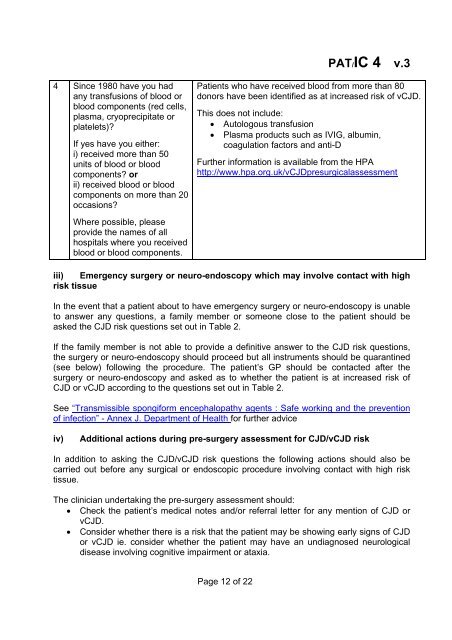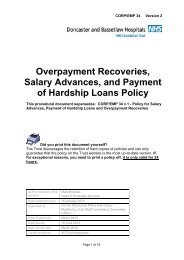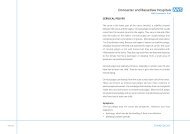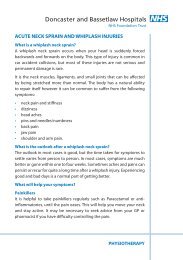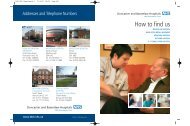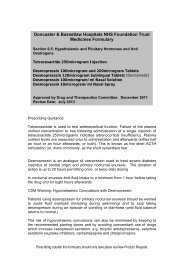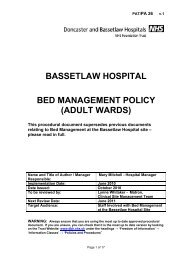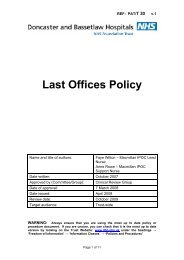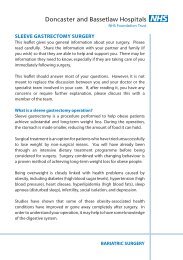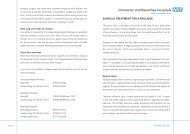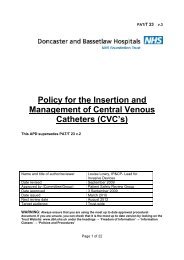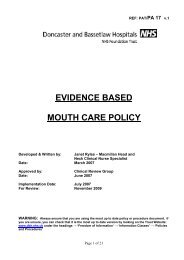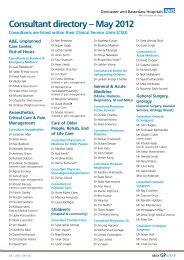VARIANT CREUTZFELDT-JAKOB DISEASE (vCJD) AND ...
VARIANT CREUTZFELDT-JAKOB DISEASE (vCJD) AND ...
VARIANT CREUTZFELDT-JAKOB DISEASE (vCJD) AND ...
Create successful ePaper yourself
Turn your PDF publications into a flip-book with our unique Google optimized e-Paper software.
PAT/IC 4 v.3<br />
4 Since 1980 have you had<br />
any transfusions of blood or<br />
blood components (red cells,<br />
plasma, cryoprecipitate or<br />
platelets)?<br />
If yes have you either:<br />
i) received more than 50<br />
units of blood or blood<br />
components? or<br />
ii) received blood or blood<br />
components on more than 20<br />
occasions?<br />
Patients who have received blood from more than 80<br />
donors have been identified as at increased risk of <strong>vCJD</strong>.<br />
This does not include:<br />
• Autologous transfusion<br />
• Plasma products such as IVIG, albumin,<br />
coagulation factors and anti-D<br />
Further information is available from the HPA<br />
http://www.hpa.org.uk/<strong>vCJD</strong>presurgicalassessment<br />
Where possible, please<br />
provide the names of all<br />
hospitals where you received<br />
blood or blood components.<br />
iii) Emergency surgery or neuro-endoscopy which may involve contact with high<br />
risk tissue<br />
In the event that a patient about to have emergency surgery or neuro-endoscopy is unable<br />
to answer any questions, a family member or someone close to the patient should be<br />
asked the CJD risk questions set out in Table 2.<br />
If the family member is not able to provide a definitive answer to the CJD risk questions,<br />
the surgery or neuro-endoscopy should proceed but all instruments should be quarantined<br />
(see below) following the procedure. The patient’s GP should be contacted after the<br />
surgery or neuro-endoscopy and asked as to whether the patient is at increased risk of<br />
CJD or <strong>vCJD</strong> according to the questions set out in Table 2.<br />
See “Transmissible spongiform encephalopathy agents : Safe working and the prevention<br />
of infection” - Annex J. Department of Health for further advice<br />
iv)<br />
Additional actions during pre-surgery assessment for CJD/<strong>vCJD</strong> risk<br />
In addition to asking the CJD/<strong>vCJD</strong> risk questions the following actions should also be<br />
carried out before any surgical or endoscopic procedure involving contact with high risk<br />
tissue.<br />
The clinician undertaking the pre-surgery assessment should:<br />
• Check the patient’s medical notes and/or referral letter for any mention of CJD or<br />
<strong>vCJD</strong>.<br />
• Consider whether there is a risk that the patient may be showing early signs of CJD<br />
or <strong>vCJD</strong> ie. consider whether the patient may have an undiagnosed neurological<br />
disease involving cognitive impairment or ataxia.<br />
Page 12 of 22


